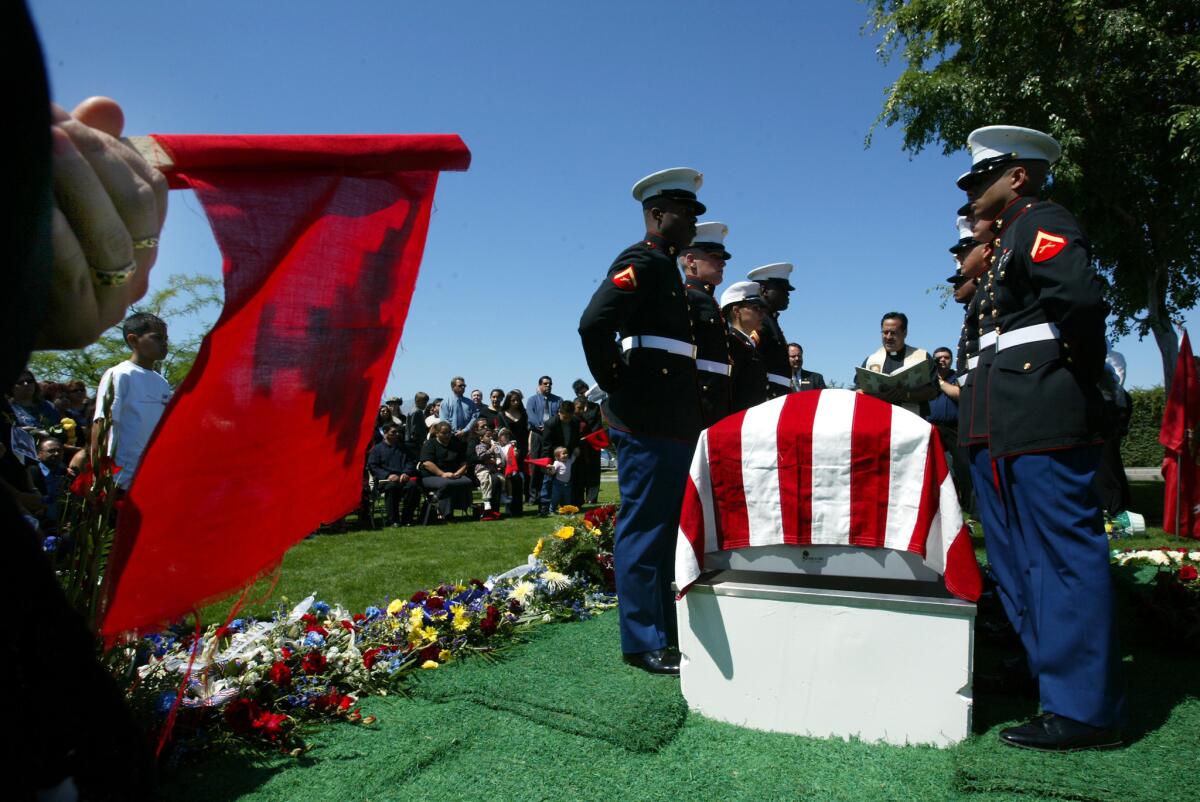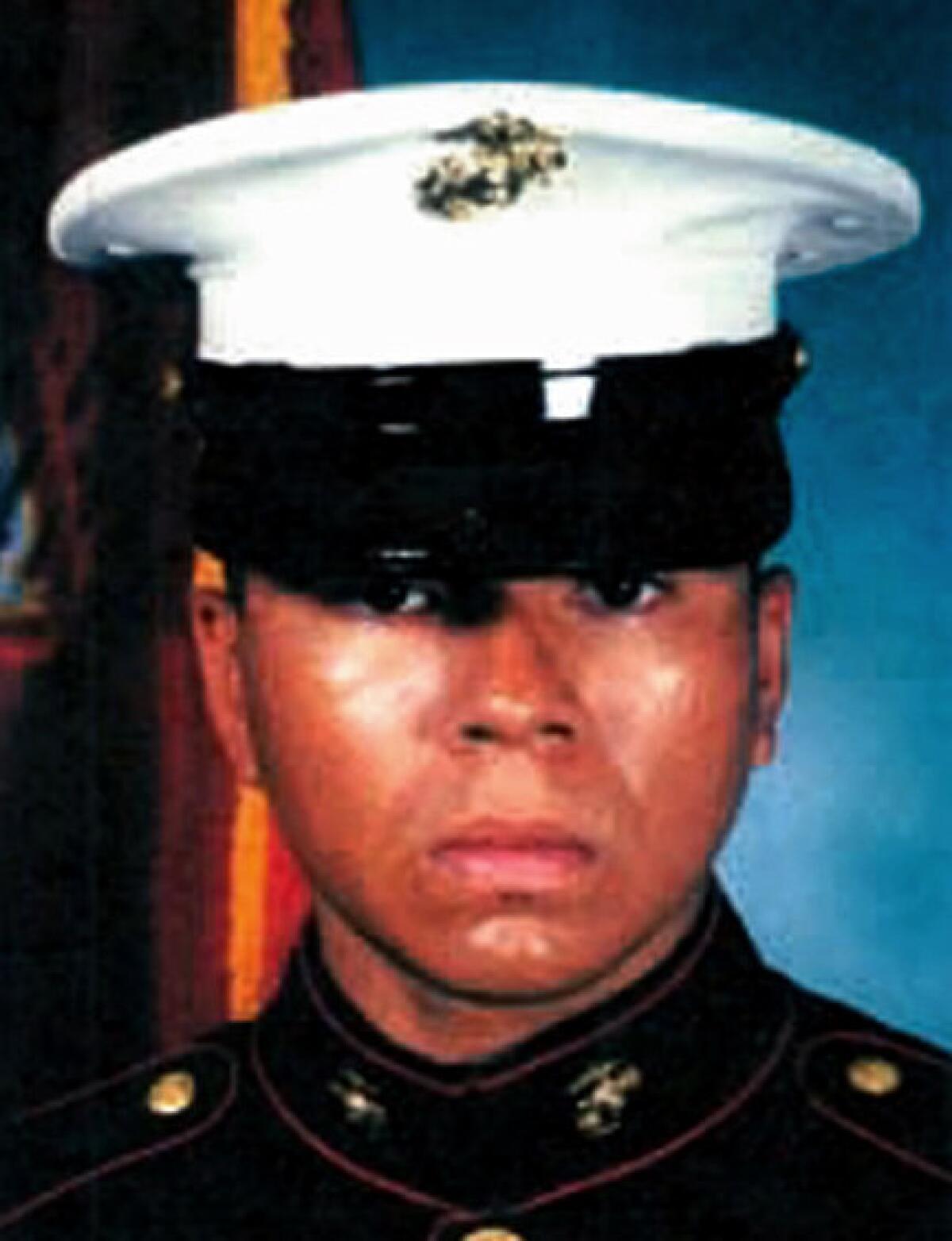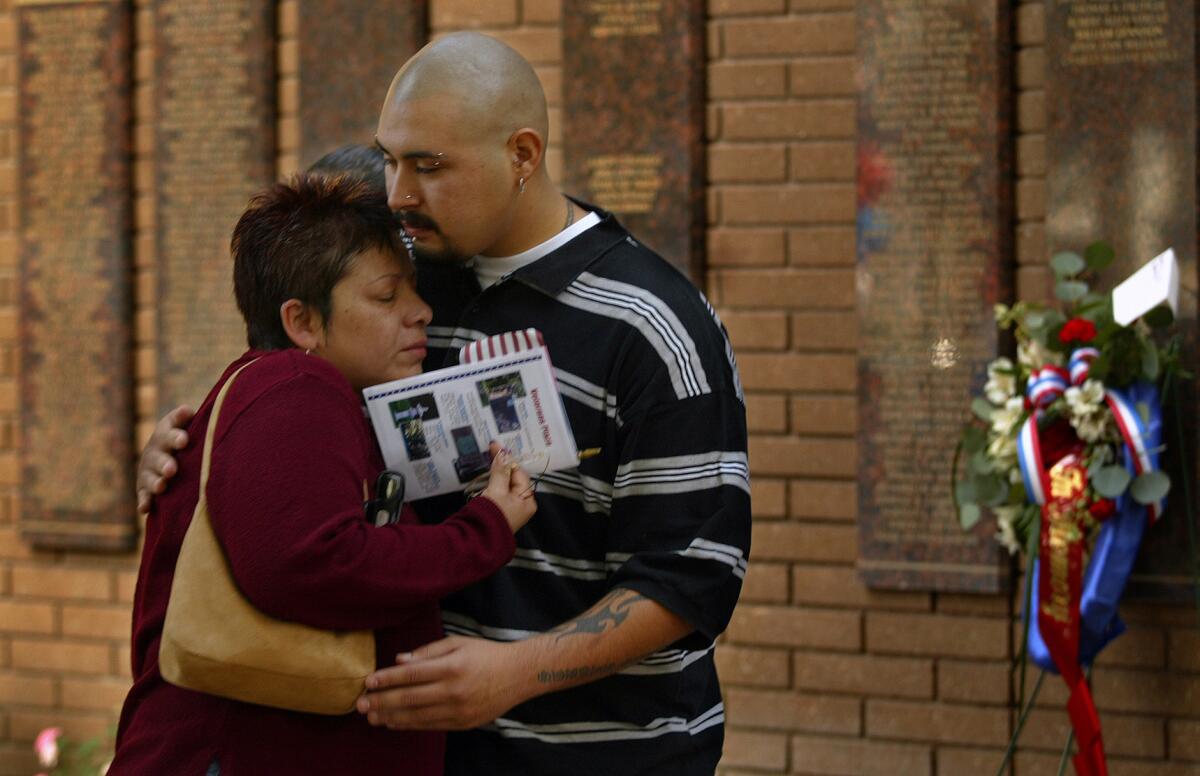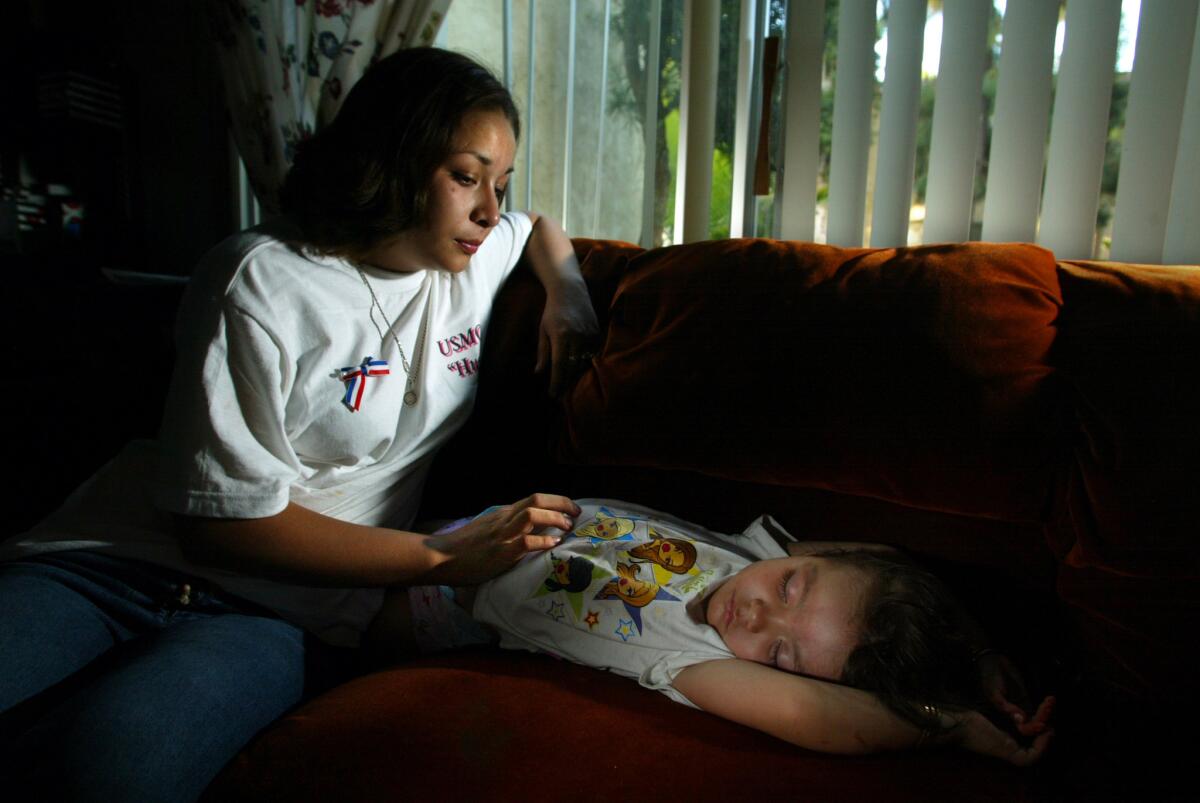From the Archives: Green Card Marines: Jesus Gonzalez made in Mexico, served for U.S.

- Share via
On this Memorial Day weekend, we take a look back at our 2003 series on Green Card Marines.
Jesus Gonzalez wore his heritage on his left shoulder.
Etched into his skin was a tattoo: "Hecho en Mexico." Made in Mexico.
His family had come north in 1989; his mother went to work for Cesar Chavez, helping the United Farm Workers organize. As a young teen, Jesus followed his stepfather into the broiling grape fields of the Coachella Valley. At Indio High School, he wore a brown beret and modeled himself after Che Guevara, helping lead a demonstration against Proposition 187 that drew 500 students and got him suspended. He learned how to pray for peace in a Native American sweat lodge and how to welcome the dawn with chants and burning sage.
Jesus Angel Gonzalez seemed, in every way, a radical in the making.
Then in his freshman year at UC Riverside, he took everyone by surprise.
He quit college and joined the Marines.
Years earlier, during the 1991 Persian Gulf War, Jesus had marched with his parents to a weapons factory on the outskirts of Coachella. In the 2003 Iraq war, Jesus stormed across the desert in a tank.
He wasn't supposed to be in Iraq. His four-year hitch was to have ended April 4. But he was among the Marines ordered to serve another year because of the war.
Signing up, he told family and friends, had been a mistake. He wanted to spend his time with his 2-year-old daughter, Delilah.
A week before shipping out, Jesus married Ivonne, the mother of his daughter, at the Indio courthouse. She had just turned 18 and wore a pink floral print dress. He wore his Marine uniform. They celebrated with dinner at the local Sizzler. Afterward, they kissed and he returned to the base.
There was a mix-up on the day Jesus left for Iraq, his wife said. She and Delilah couldn't get a ride to see him off. Jesus waited alone as others hugged their loved ones and said their goodbyes.
He never saw his family again.
In his last letters to Ivonne, he sounded troubled, about his fate, about their marriage. He had dreamed she died in a car accident. While waiting in Kuwait, Jesus wrote how sandstorms had ripped down the shelters they'd put up. "I'm this close to losing my head," he wrote. "Everything's gotten real ugly."
I don't know what's going to happen. I don't know what's going on. I don't know what to tell you.
— Jesus Gonzalez
In his last letter, dated March 17, Jesus revealed his despair, "I don't know what's going to happen. I don't know what's going on. I don't know what to tell you."
Jesus and his tank battalion finally rolled into Baghdad to chaos and cheers. His battalion was ordered to guard a sprawling hospital compound. On April 12, a week after completing his four years in the Marines, Jesus was fatally shot outside his tank.
His mother, Silvia Berrones, said she is tormented by her son's decision to join the military. She agonizes over the years she spent organizing field workers up and down California, leaving her family when Jesus was a teenager.
During Jesus' childhood, she had removed the guns from his toy soldiers, restricted time in front of the TV and pointed his attention to schoolwork and the struggle for justice among working people -- all for one reason, she said.
"I wanted him to do something important."
Jesus wanted that, too. But like a lot of young people, he was searching for his own way.
Activist's Roots
Silvia Berrones began her own activism as a teenager, while working as a secretary at the Federal Electricity Commission in Linares, a city in northern Mexico. One day, she said, she read a company contract that crossed her desk and later discovered that workers were being exploited. She spread the word and battled the bosses on the workers' behalf.
After marrying at 18 and giving birth to a daughter, Carla, and then Jesus, Silvia did what most women in Linares would never imagine. She divorced her husband, Jesus Gonzalez Sr. Jesus was 3, Carla, 7.
Relatives said her husband, a bus driver, was often away from home and showed little interest in his family. "From the beginning, it was like she was a single mother," said Jesus Sr.'s mother, Rafaela Sanchez.
Silvia later married a longtime friend, Leopoldo Trevino-Sosa. He was a medical student who also believed in unions and was not afraid to speak his mind.
Jesus and his family lived next to a military barracks. The boy would study the soldiers as they marched out with their rifles and green uniforms. Leopoldo remembered one day when the troops paraded through town, and Jesus tried to dart out to join them. "I had to hold him back," he said.
When Jesus was 6, he moved with his family to the Coachella Valley, eventually settling in Indio.

The six family members shared a one-room studio in a crumbling 1920s motel on the north side of town, not far from the fields kept green by the All American Canal.
After classes at Thomas Jefferson Middle School, Jesus walked nearly a mile to an elementary school where he waited for his younger sisters, Silvia and Yardena, to walk them home.
Older sister Carla did the cooking, and Jesus would help peel potatoes when he got home. He watched the little ones while they waited for their parents. The family ate their meals in shifts, two at time, on a card table, squeezing by each other in the small room.
Leopoldo spent hours in the fields, earning $200 to $500 a month picking grapes, barely making it.
He and Silvia signed up workers for the UFW in the Coachella Valley, a stronghold of support for the union. They hauled their children to rallies, where Jesus handed out buttons and fliers. At one UFW dinner, Jesus watched as Carla handed Cesar Chavez a bouquet of bright flowers.
At home, Leopoldo played chess with the children. The family talked about history and politics, about the importance of college.
Carla and Jesus asked their stepfather if they could get jobs over summer vacation. He took them to work in the fields. "I wanted my children to learn," he said.
By 4 in the morning, they were eating breakfast. They hit the fields before sunrise. Temperatures reached 120 degrees, and Carla and Jesus tossed raisins into the 5-gallon buckets, racing to finish before the noon sun burned overhead.
It was a lesson that Jesus would not forget.
"Working in the fields would be a tough way to make a living," he later wrote. "It's better to get an education and not have to suffer as much."
Campus Involvement
Jesus entered Indio High as a seasoned activist.
"He was real serious," said Sonia Perales, who was three years older. She was president of the campus chapter of the student group Movimiento Estudiantil Chicano de Aztlan.
She and Jesus held Chicano education nights. They learned about the Mexican American civil rights struggle, and they watched videos about Chicano history and the labor battles of migrants working the fields.
Jesus wore his hair in a ponytail and wore T-shirts of his favorite Mexican rock bands.
He was quiet during class, preferring to express himself in flowery essays, teacher Albert Fuller recalled. Che Guevara "was his hero, his role model," Perales said.
Jesus kept a journal in Spanish. As a Mexican immigrant, he said, it was important to take a stand against Proposition 187, which called for the denial of most public benefits to anyone who had illegally come to California.
Jesus and hundreds of classmates walked out of Indio High School and paraded to City Hall. "People cheered us on," Jesus wrote in his journal, "and it felt good."
When Jesus was a high school sophomore, Silvia Berrones was offered a paid position with the UFW. It was in Salinas, about 360 miles north.

Silvia took the job and would be gone for eight years. It was a move that would weigh heavily on Jesus.
"I knew he felt bad," his mother said.
She said that she asked Jesus and his sisters to come with her, but that they wanted to stay in Indio with their friends. Silvia would visit her family several times a year, Carla recalled, and the children also would travel up north to see their mother.
Carla had left home to attend UC Irvine, where she earned a degree in anthropology.
With Silvia gone and Leopoldo working two jobs, much of the burden fell on Jesus. He cooked dinner after school, and had to watch his younger sisters.
In his essay for admission to the University of California, he said that his parents were going through personal problems and that their separation was difficult on the family.
"My last two years of high school have been the toughest," Jesus wrote, "not only because the decisions I make are going to decide my future, but also because my family has been going through many financial and emotional problems."
He managed a 3.7 GPA and had earned A's in advanced algebra, geometry and calculus. Jesus said he was frustrated, but would not let obstacles keep him from becoming an electrical engineer.
"My family's problems won't stop me from getting good grades," he said. "I know I can accomplish this goal." He was accepted by UC Riverside and graduated from high school in 1998.
He went back to Mexico that summer to visit cousins and uncles.
His grandfather, Victor Berrones, sensed that Jesus was troubled. Perhaps it was because his mother had gone away, Berrones thoughtmaybe because Mexico reminded Jesus that he never got to know his biological father.
"Everyone had scattered on him," his grandfather says. "He wanted a place."
College Loses Appeal
Jesus began his studies at UC Riverside in the fall of 1998. Within his first few weeks, he already knew that college wasn't for him, recalled Islene Leon.
They met as freshmen during the second week of school and started dating, she said.
Leon described Jesus as a quiet guy who didn't talk much about his family. The one thing he did talk about was how unhappy he was with college. Jesus talked about moving back to Mexico and working in the fields, she said. He told his cousins in Houston that he might move there and be a state trooper.
"I always felt like he wasn't sure what he wanted to do," Leon said.
She said Jesus draped a Mexican flag across the wall of his campus dorm. He urged Leon, a second-generation Mexican American, to learn Spanish, and he played his favorite Mexican rock music for her.
Jesus liked drinking beer and tequila, Leon recalled. He got a tattoo and they danced to hip-hop at clubs in Riverside and San Bernardino. "He was a really good dancer," she says.
During his second quarter, Jesus told his parents he was tired of studying, tired of lectures.
He told them the secret he had kept for weeks: The boy who had once rushed out to watch soldiers march past had grown up and joined the Marines.

Staff Sgt. Ramon Arredondo remembers Jesus was the only UC Riverside student he signed up while working in the Indio recruiting office. Jesus confided that he needed to try a different path. The young man didn't strike Arredondo as a typical gung-ho fighter, the recruiter said.
"He just wanted a little more direction," Arredondo recalled during a telephone interview from Okinawa, Japan. "The school wasn't going as fast or as easy as he thought.... He wasn't leaving school to leave it forever. He knew he was coming back to it."
He spoke proudly of his mother, Arredondo said, and how she had worked with Cesar Chavez.
Jesus went to boot camp in April 1999 and was assigned to the 1st Tank Battalion at the Twentynine Palms base. He seemed as happy as he had ever been, relatives said. His sister Carla remembers him boasting of how he could break down a gun.
He met Ivonne Avalos. She was the 15-year-old sister of the wife of his Marine buddy Rene Leon. Ivonne was a petite, quiet girl who went to Kearny High School in San Diego. Like Jesus, she was a Mexican immigrant. Like Jesus' parents, her parents had divorced when she was young.
"We just connected," Ivonne said.
She said Jesus got tired of the Marines. He liked riding tanks, but he didn't like taking orders.
Leon said Jesus talked about "how much common sense our superiors lacked.... He didn't like people that didn't think about things."
Jesus also confided in cousin Rolando Mireles, who lives in Houston.
"He said it was a mistake to join," Mireles says.
Ivonne said Jesus became more frustrated and at times would drink heavily.
Leon said that he and Jesus were once caught driving onto the base when they were drunk. As a result, Jesus was restricted to quarters when Ivonne was nine months pregnant. Like his own father in Mexico, he was not there to see the birth of his baby.
His dissatisfaction continued to build, Ivonne said, and he was looking forward to getting out of the Marines when his term was scheduled to end in April. But as talk of war heated up, Jesus became angry when he learned his enlistment was being extended a year.
"He didn't want to go," his wife said. "He was scared.... He didn't want to die."
Trying to Understand
Jesus' body was brought back to the Coachella Valley, and he was buried a few miles west of the weapons factory where he once marched in protest. His family and friends revisit their memories now, trying to understand Jesus' transformation from social activist to college student to Marine tank fighter.
His wife, Ivonne, sits on the brown shag carpet in the living room of her Escondido apartment and sorts through the letters Jesus mailed during his last days. They'd had trouble in their short time together, and in one letter Jesus wrote that he would understand if she decided to leave him.
In another letter, he said: "Everything is going to be good in a few months. And I am going to come home to the family that I most love and miss.... Don't give up on me. We are barely starting as a married couple."
Sign up for Essential California
The most important California stories and recommendations in your inbox every morning.
You may occasionally receive promotional content from the Los Angeles Times.








